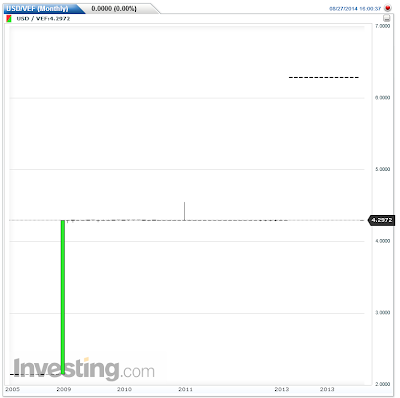Venezuelan Bolivar Plunges To Record Low On Black Market; Bond Default Coming Up In October?
Please consider the "official" exchange rate of the Bolivar to the USD.
- From 2005 to 2009 the official exchange rate was 2 bolivars to one US dollar.
- In 2009 the official exchange rate soared to 4.3 to the dollar.
- In 2013 the official exchange rate soared to 6.3 to the dollar.
Venezuela allows "very limited" trading at 50 to the US dollar in a parallel exchange called Sicad II.
On the black market today, it takes 89 bolivars to buy 1 US dollar. That is a 95% loss in value vs. the official exchange rate since 2013.
Black Market Record Low
Bloomberg reports Venezuela’s Black Market Bolivar Slides to Record Low.
Venezuela’s bolivar fell to a record low against the U.S. dollar on the black market today as the government tightens currency rationing to pay maturing debt.
A dollar fetched 89 bolivars on the Colombian border today, compared with the official exchange rate of 6.3 bolivars, according to dolartoday.com, a rate-tracking website. Two black market traders in Caracas, who asked not to be named because the trading isn’t legal, confirmed the record-low rate.
Inflation reached 60.9 percent in May, the last month for which figures are available, while according to economists surveyed by Bloomberg gross domestic product shrank 2.1 percent in the second quarter. The economic decline is pushing people to seek out dollars to protect the value of their savings, at the same time that the government tightens supply, Henkel Garcia, director of Caracas-based consulting firm Econometrica, said by telephone.
“The government has reduced disbursements of dollars at the secondary markets in recent weeks,” said Garcia, citing non-public data from the Venezuelan Banking Association. “They are trying to save up as many dollars as possible to meet obligations to bondholders.”
Venezuela has $4.5 billion of bonds maturing in October, according to data compiled by Bloomberg. The country’s foreign reserves reached an 11-year low of $20.1 billion on Aug. 21.
Officials have tried jailing traders, shuttering brokerages and setting up four parallel exchange systems to stem the rise of the unofficial rate in the 11 years since former President Hugo Chavez began controlling the bolivar’s price. Currency controls have failed to slow the world’s fastest inflation, while leading to shortages of everything from razors to cars.
The content on this site is provided as general information only and should not be taken as investment advice. All site content, including advertisements, shall not be construed as a ...
moreComments
Please wait...
Comment posted successfully.
No Thumbs up yet!




